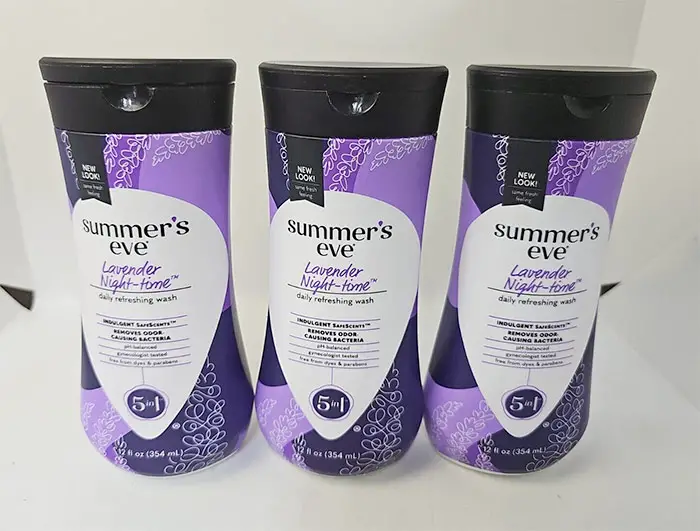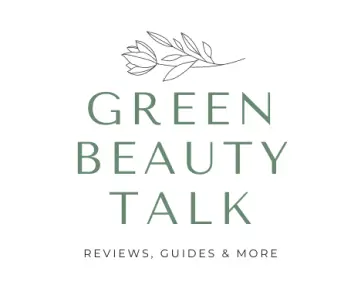Every woman at some point in life wonders if her vagina has a normal smell. That is why lots of women use feminine products like the Summer’s Eve intimate wash, wipes, sprays and cloths to help them “smell nice”.
But is Summer’s Eve truly good for you, or could it be bad for your intimate health? In this article, we’ll delve deep into the ingredients and potential side effects of Summer’s Eve Cleansing Wash, helping you determine whether it’s a wise choice for your personal care.

Table of Contents
- What’s Inside Summer’s Eve Cleansing Wash?
- Potential Side Effects of Summer’s Eve Wash
- Is Summer’s Eve Disrupting Your pH Balance?
- Does Summer’s Eve help with vaginal discharge?
- Does Summer’s Eve help with vaginal itching?
- Will using a Summer’s Eve wash help with smell?
- Summer’s Eve During Pregnancy: Is It Safe?
- Summer’s Eve vs Vagisil: Which is better?
- Are Summer’s Eve wipes bad for you?
- Final Thoughts: Is Summer’s Eve Good or Bad for Your Vag?
What’s Inside Summer’s Eve Cleansing Wash?
Intimate washes are designed to help keep the vulva clean. However, in the process of washing your vulva, it can happen for a product to get into the super-sensitive vagina. This can cause irritations and infections. Therefore knowing what is in these products is essential to avoid any mishap.
For over forty years Summer’s Eve has produced a variety of cleansing intimate washes. Most have similar ingredients except for differences in fragrances and a few essential oils.
For this article, we picked the 5 in 1 Cleansing Wash for sensitive skin as our sample as it is one of the most popular products from the brand. We shall take a closer look at what is in this product to understand its potential benefits or risk.
Ingredients in Summer’s Eve Cleansing Wash
Safe and Common Ingredients:
- WATER: Serves as a solvent.
- LAURYL GLUCOSIDE: A sugar-derived surfactant used as a cleanser. Generally considered safe for cosmetic use.
- LACTIC ACID: Used as a humectant and pH adjuster.
- SODIUM CHLORIDE: Commonly known as table salt, it’s used as a viscosity adjuster in cosmetic products.
- ALPHA-GLUCAN OLIGOSACCHARIDE: A skin conditioning agent
Ingredients That Might Cause Irritations:
- SODIUM LAURETH SULFATE: A cleansing agent that presents a risk of skin and vulvar irritations.
- COCAMIDOPROPYL BETAINE: A surfactant associated with irritation and allergic reactions. This could be due to the ingredient itself or impurities present in it.
- POLYQUATERNIUM-7: An antistatic agent and form filler used for its conditioning effect on the skin. Some individuals might experience sensitivity.
- FRAGRANCE: Can be a potential allergen and irritant, especially for sensitive areas.
- LAURYL GLUCOSIDE: Is a sugar-derived surfactant used as a cleanser. It is considered safe to use in cosmetics but may cause slight irritations
- SODIUM HYDROXIDE: Also called caustic soda, it’s used as a buffering agent and is considered safe in cosmetics at a restricted concentration. Sodium hydroxide is highly alkaline and is used to balance and maintain the pH of skincare products. While it is generally considered safe in small amounts and low concentrations, it can cause chemical burns, hives, and skin damage at high concentrations. Individuals with sensitive skin might experience reactions like hives, rash, or itchy skin, flaking, dryness, and increased skin sensitivity, inflammation, and irritation, or redness.
Preservatives:
- SODIUM BENZOATE: A preservative in cosmetics considered safe in restricted dosages.
- DISODIUM EDTA: A chelating agent used to neutralize metal ions in a product, acting as a preservative.
Potential Side Effects of Summer’s Eve Wash
While Summer’s Eve Cleansing Wash is a popular choice for many, it’s crucial to understand the potential side effects that may arise from its use, especially considering the intimate area it’s designed for. Let’s delve deeper into how specific ingredients might contribute to these side effects, ensuring you’re informed about the potential risks involved.
1. Contact Dermatitis and Allergic Reactions
- Fragrances: Often included to provide a pleasant scent, fragrances can be a common irritant, especially in sensitive areas, potentially leading to contact dermatitis.
- Cocamidopropyl Betaine: While it’s a surfactant that aids in cleansing, it has been associated with irritation and allergic reactions, which might be due to the ingredient itself or impurities within it.
2. pH Imbalance and Resulting Issues
- Fragrances: Besides potentially causing irritation, fragrances can offset the pH of the vagina, which might foster the growth of yeast, leading to infections.
- Sodium Hydroxide: Although used to balance the pH of the product, if the concentration is not finely tuned, it could potentially disrupt the natural pH balance of the vagina, given its highly alkaline nature.
3. Dryness and Itching
- Sodium Laureth Sulfate: This cleansing agent, while effective in cleaning, presents a risk of skin and vulvar irritations and can strip the skin of its natural oils, leading to dryness and itching.
- Cocamidopropyl Betaine: As mentioned, this surfactant can cause irritation, which might manifest as dryness or itching in some users.
4. Worsening of Pre-existing Conditions:
- Fragrances and Harsh Surfactants: For individuals with pre-existing vaginal conditions like bacterial vaginosis, the irritation from fragrances and harsh surfactants like sodium laureth sulfate might exacerbate the condition.
Is Summer’s Eve Disrupting Your pH Balance?
Although the cleansing wash is meant for external use on the vulva, products can easily get into the vagina in the process and cause irritations.
The vagina, a muscular canal responsible for menstrual flow and childbirth, has a unique and delicate ecosystem. This ecosystem is self-sustaining and self-cleaning, ensuring a balanced environment.
A crucial aspect of this balance is the vagina’s naturally acidic pH, which typically ranges between 3.5 – 4.5. This acidity is vital as it prevents the growth of harmful bacteria, thereby reducing the risk of infections.
However, introducing external products, especially those not pH-balanced, can disrupt this natural acidity. While Summer’s Eve claims its products are pH-balanced, the inclusion of certain chemicals like fragrances, essential oils, and potent surfactants can alter the vaginal pH.
A disrupted pH balance can pave the way for yeast overgrowth, leading to infections, and can also harm the beneficial bacteria that form the vaginal microbiome. It’s essential to be cautious and informed about the products we use in such sensitive areas.
Does Summer’s Eve help with vaginal discharge?
The Summer’s Eve cleansing wash does not contain any active ingredients capable of preventing or treating vaginal discharge. Abnormal vaginal discharge is a sign of possible infection and you should see your doctor for treatment.
Does Summer’s Eve help with vaginal itching?
The brand claims on their website that using their cleansing wash can offer some relief. However, it is best to see a doctor in case of vaginal itching and stop the use of any feminine hygiene products unless your doctor says otherwise.
Will using a Summer’s Eve wash help with smell?
The Summer’s Eve intimate washes are designed to help reduce the bad smell. Most formulas contain fragrance to this effect.
However, you should note that fragrances are not good for such a sensitive part of the body. The vagina has its own natural smell and trying to get it to smell like flowers or fruits is not necessary.
Summer’s Eve During Pregnancy: Is It Safe?
Personal hygiene is very important during pregnancy as the body tends to change and you may develop an odor down there. However, it is best to see your gynaecologist before use.
Summer’s Eve vs Vagisil: Which is better?
Examining the ingredients of feminine washes from Summer’s Eve and Vagisil, notable similarities and differences emerge. Both brands utilize various surfactants and preservatives, such as sodium laureth sulfate and sodium benzoate, which can potentially cause irritations for some users. However, Vagisil’s pH Balance Wash includes additional ingredients like aloe barbadensis leaf extract and tocopheryl acetate (Vitamin E), which are known for their soothing and antioxidant properties, respectively.
In terms of safety and potential irritants, both washes contain fragrances and sodium laureth sulfate, which might be concerning for individuals with sensitive skin or existing irritations. However, Vagisil’s inclusion of aloe and vitamin E might offer a slight edge in terms of potential soothing effects on the skin.
In conclusion, while both feminine washes have their similarities and potential drawbacks due to the inclusion of common irritants, Vagisil might be marginally better due to the incorporation of skin-soothing ingredients.
However, keep in mind that these products are not the most natural, therefore we would not recommend any of the brands.
Are Summer’s Eve wipes bad for you?
According to the Women’s Voices for the Earth organization, feminine wipes, in general, are not only bad for the earth but equally for women’s health.
Wipes contain harmful chemicals such as fragrance, preservatives, sulfates, and parabens that can be harmful. In the case of the Summer’s Eve wipes, they contain not only fragrance but also formaldehyde releasers; a preservative known to cause allergic reactions.
Examining the ingredients of Summer’s Eve wipes:
- Fragrance: Known to be a potential irritant, especially in sensitive areas, and can cause allergic reactions or contact dermatitis.
- Sodium Benzoate: Used as a preservative, it’s generally recognized as safe but can convert to benzene, a known carcinogen, in certain conditions.
- Lactic Acid: While it’s used to maintain the pH, it can be irritating to some people, especially those with sensitive skin.
- Phenoxyethanol: A preservative that can cause skin and lung irritation.
- Polysorbate 20: Although it’s used as an emulsifier, there have been concerns about its safety in personal care products.
These ingredients, particularly fragrances and certain preservatives, can potentially cause irritations or allergic reactions, especially in the sensitive genital area, for this reason Summer’s Eve Wipes are not really good for you.
While the convenience of wipes might be appealing, it’s vital to consider these potential risks and consult with a healthcare professional, especially if you experience any adverse reactions, to explore safer alternatives.
Final Thoughts: Is Summer’s Eve Good or Bad for Your Vag?
Before choosing a product it is important to know if you trust the brand provides the best solutions for your vaginal health. While the Summer’s Eve cleansing wash is very popular, a look at its ingredient list shows that it is not 100% safe as it has considerable side effects.
If you have a sensitive genital area, it is best to steer away from such fragrance-based products.
Does this mean Summer’s Eve is bad? The answer can not be a clear-cut no. Because a lot of reviews from women indicate they enjoy using Summer’s Eve products despite the potential side effects they may have. For safety purposes, it is best to consult with a doctor or pharmacist before use.
Also keep in mind that, research shows that feminine products are more harmful to women not only in physical terms via exposure to potentially harmful products.
The feminine products industry thrives on selling the notion that women need vaginal care products because their vaginas are not clean. Which is not true.
At the end of the day, the vagina cleans itself on its own, and while the vulva needs to be washed, using warm water is truly all you need. However, if you want to try a feminine wash, just remember they are meant for external use solely.

Petra Nakashian (previously Kravos) is a dedicated natural health and beauty blogger, driven by the loss of her parents to cancer, which led her to meticulously research beauty product ingredients. With over 10 years of experience, her in-depth knowledge has made her a trusted expert in the field. Founder of Be Healthy Now and Green Beauty Talk, Petra recently expanded her expertise with Beauty Insights Hub, exploring a wider range of beauty treatments. Committed to transparency and honesty, her work is a vital resource for navigating the complex world of beauty.

